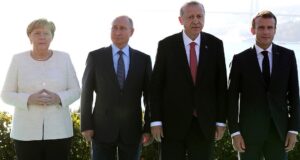Guest Contributor: Kenny Stevenson
28th August 2013
‘Was the price too high?’ asked Kirsty Wark. ‘Of course the price is very, very high’, replied Tony, ‘but think of the price people paid before Saddam was removed’.
Defiant as ever, Blair strolled through his Newsnight interview to mark the approaching tenth anniversary of the invasion of Iraq, albeit perhaps in a tone of desperation. He self-admittedly has no hope of converting his critics. Long gone are his days as the dispatch box suave Gav, the charmer who could smooth talk anyone to stand alongside him. Those critics would probably agree he’s a charmer – just more of the serpentine variety.
For all the bruising his credibility has taken over the past decade, his foreign policy outlook is as resilient as ever. He articulately laid out his ideal vision of the Middle East and Britain’s role in the world. He emphatically denied the war was launched in bad faith – ‘what happened in Iraq was not deceit or deception’- and claimed ‘the worst argument’ he had heard against the war was that Saddam being in power today would check the power of Iran. He still has all the enthusiasm he displayed in his 1999 speech in Chicago where he became the high priest of liberal interventionism. People are being ‘wiped out’ in Syria and this requires a ‘stronger line’; without it, the extremist elements of the opposition could take control. The consequences of non-intervention must be recognised and could actually create greater problems long-term. Perhaps most controversially, he argued the UN Security Council is ‘not a supreme court’: our interests are tied up in the Middle East’s ongoing conflicts and we have a right to ensure that ‘sensible people’ win these wars. We should be ‘engaged’ in these struggles: France’s Mali intervention has shown how difficult it is to stay completely out of the way.
Contrast this line to the ones now taken up by key players in the Blair government. Back in October, Jack Straw, the then-Foreign Secretary, gave a muddled chronology of the events which led him to support the War. The decision to vote for the War is ‘something I’ll have to live with’. Lord Prescott, former Deputy Prime Minister, thinks the war cannot now be justified but also bizarrely claims he backed the invasion at the time because ‘Bush was quite prepared to have a plan for Israel’. This does not make much sense, and it is worrying that neither Andrew Neil nor Michael Portillo challenged him on it. To be anti-Iraq War is now the default ‘correct’ line to toe, regardless of one’s reasoning for taking said position.
To be clear, I am not knocking Straw and Prescott for changing their minds – they are of course free to do so. The invasion of Iraq does not fit neatly into Blair’s liberal interventionist vision. As Blair himself admits, daily life in Iraq post-Saddam is not as prosperous as it should be. Anywhere between 100,000 and 650,000 Iraqis died between the invasion and withdrawal of troops, as well as 179 British soldiers. Many legitimate questions on the lead-up to the War also remain unanswered.
But Straw and Prescott, since they were privy to the decision to go to war, should be more willing to talk up the positives of the invasion. The Shias of the south, repressed and excluded from political life under Saddam, have benefitted as relations between Shia and Sunni communities incrementally improve. The Iraqi Kurds have unquestionably fared well having suffered horrifically under Saddam, including gas attacks. They now have autonomy over their territory in Northern Iraq and turnout was as high as 80 per cent at the last election. Polling carried out in April 2012 also showed some signs of improvement. 56 per cent of Iraqis believed security was improving and more thought sectarianism was decreasing (47 per cent) than increasing (42 per cent). 52 per cent also believed the economy was strong and more thought the country was headed in the ‘right’ (48 per cent) than ‘wrong’ (44 per cent) direction.
It is unfortunate the British anti-war movement is not interested in a sensible and reasoned debate on Iraq. So blinded by their hatred of Bush, Blair and everything ‘West’ that they cannot see past their own stupidity and hypocrisy. They churn out conspiracy theories of war criminals and oil barons but dismiss the independent inquires that rubbish these myths. The same fate will befall the Chilcot Inquiry if it fails to find Blair is Pol Pot reincarnate in the back pocket of JP Morgan, as this lunatic seems to think. They care so much about the Palestinians that they refuse to condemn Hamas rocket attacks on Israeli citizens which have done nothing but set back the peace process. They are silent on the repressive tactics of the Iranian regime and more likely to criticise the Syrian rebels than Assad, but they are happy to deride the West for ties to the Saudi and Bahraini dictators. There is no point in referencing a single Stop the War article: visit the website yourself and spot the formula. Liked by America? Bad dictator. Loathed by America? Good dictator.
This, by the way, is not a defence of Britain’s ties to dictators. The Saudis are among the last I would be selling military equipment to, given their shocking human rights record, especially women’s rights. I do however accept Britain is Saudi Arabia’s second biggest foreign investor after the US. It is extremely difficult for any incoming government to alter relations without significantly affecting British jobs and livelihoods. That is the bitter, cold reality.
 Human Security Centre Human Rights and International Security Research
Human Security Centre Human Rights and International Security Research



